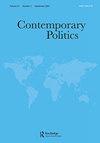Spreading a norm-based policy? Sweden’s Feminist Foreign Policy in international media
IF 2
3区 社会学
Q1 POLITICAL SCIENCE
引用次数: 7
Abstract
ABSTRACT Since 2014, Sweden has pursued the world's first Feminist Foreign Policy (FFP). However, the effectiveness of its policy promotion depends on how Sweden's efforts to spread this norm-based policy are perceived and evaluated by other states. We argue that a policy promotion effort has to be perceived as legitimate, coherent and salient by target populations in order to be effective. We investigate the extent to which it is the case in national newspapers of 17 countries, representing world and regional powers. We demonstrate that most coverage of the FFP is rather modest, notably in non-Western countries. Further, we argue that the coverage of Sweden's FFP in foreign media is influenced by three challenges: (1) an absence of a universal definition of FFP; (2) a clash between ideals of FFP and Swedish “traditional” security and commercial interests; (3) an uneasy relationship between the concept of feminism and media in many countries.传播以规范为基础的政策?国际媒体中的瑞典女权主义外交政策
自2014年以来,瑞典推行了全球首个女权主义外交政策(FFP)。然而,其政策推广的有效性取决于瑞典传播这一基于规范的政策的努力如何被其他国家感知和评估。我们认为,政策促进工作必须被目标人群认为是合法的、连贯的和突出的,才能有效。我们调查了在代表世界和地区大国的17个国家的全国性报纸中这种情况的程度。我们证明,FFP的大部分覆盖范围相当有限,特别是在非西方国家。此外,我们认为外国媒体对瑞典FFP的报道受到三个挑战的影响:(1)缺乏FFP的普遍定义;(2) FFP理念与瑞典“传统”安全和商业利益之间的冲突;(3)在许多国家,女权主义概念与媒体之间的关系并不和谐。
本文章由计算机程序翻译,如有差异,请以英文原文为准。
求助全文
约1分钟内获得全文
求助全文

 求助内容:
求助内容: 应助结果提醒方式:
应助结果提醒方式:


